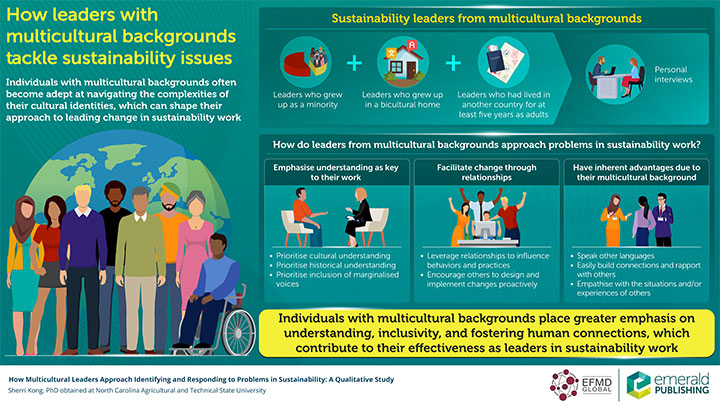The 2023 winner of the Emerald and EFMD Outstanding Doctoral Research Awards is Sherri Kong, whose insightful study investigated the management approach of multicultural leaders to sustainability work.

Dissertation title: How multicultural leaders approach identifying and responding to problems in sustainability: A qualitative study
Institution: North Carolina Agricultural and Technical State University
PhD obtained at: North Carolina Agricultural and Technical State University
Individuals who grow up in multicultural surroundings often find themselves navigating the complexities of their mixed identities.
While a multicultural upbringing presents several challenges to overcome, it can also shape individuals in interesting ways. Dr. Sherri Kong’s research explores how leaders from multicultural backgrounds approach the problems related to sustainability.
"As a mother of bicultural children and having lived overseas myself, I recognised the complex thinking skills that emerge from navigating one’s identity between cultures. I was curious about how these cultural experiences could help a leader working in sustainability, since all sustainability issues cross borders," Dr. Kong explains.
Dr. Kong’s research illustrated how experiences negotiating one’s cultural identity prepares leaders for sustainability work in several ways. Multicultural leaders tend to emphasise cultural and historical understanding when addressing issues. They also prioritise collaborative problem-solving efforts and find opportunities to include underrepresented voices in uncovering solutions. Additionally, they leverage language abilities and empathy to build connections with others.
"The main implication of my research is that leaders from multicultural backgrounds have the cultural understanding and insight to navigate complex situations. We had participants share examples of how they used their cultural knowledge and language skills to facilitate dialogue, generate ideas, and influence behavior change," observes Dr. Kong.
During her interviews with multicultural leaders, Dr. Kong documented several inherent benefits they experienced in the work environment. Notably, the multicultural qualities of these leaders provided them with greater access to people and discussions in the field. Dr. Kong notes that “Participants told stories of being accepted into different cultures because of their appearances, language abilities, and even minority status. These new relationships gave them levels of insight into problems that they otherwise would not have been privy to."
During her interviews, Dr. Kong observed that navigating one’s identity between cultures can result in a person focusing on differences and how they are not fully part of one culture or another. Many of these leaders are largely unaware of the advantages of their multicultural backgrounds unless they are prompted to articulate them. "Several participants commented that they had never thought about their cultural background as advantageous until they reflected on it during the interviews. I know it would be meaningful for these leaders if their stories inspired others from similar backgrounds to pursue careers in sustainability," Dr. Kong notes. "I hope that more people from bicultural and minority backgrounds recognise that their unique abilities are needed to address sustainability-related issues."
Leaders with a multicultural upbringing bring valuable skills to the companies they work for. Skills such as fostering collaborative action and building connections with workers are highly sought-after in sustainability work. Therefore, companies may stand to benefit by integrating more multicultural leaders into their teams. "Sustainability education programs are incorporating activities to build cross-cultural and intercultural competencies in their students. My research suggests that graduate programs and companies would benefit from actively recruiting individuals from multicultural backgrounds who already possess these competencies" Dr. Kong concludes.

How leaders with multicultural backgrounds tackle sustainability issues?
Individuals with multicultural backgrounds often become adept at navigating the complexities of their cultural identities, which can shape their approach to leading change in sustainability work.
Title: What makes for successful collaboration with Indigenous people?
Methods section:
Sustainability leaders from multicultural backgrounds
- Leaders who grew up as a minority
- Leaders who grew up in a bicultural home
- Leaders who had lived in another country for at least five years as adults
Personal interviews
Result section:
How do leaders from multicultural backgrounds approach problems in sustainability work?
- Emphasise understanding as key to their work
- Prioritise cultural understanding
- Prioritise historical understanding
- Prioritise inclusion of marginalised voices
- Facilitate change through relationships
- Leverage relationships to influence behaviours and practices
- Encourage others to design and implement changes proactively
- Have inherent advantages due to their multicultural background
- Speak other languages
- Easily build connections and rapport with others
- Empathise with the situations and/or experiences of others
Key message:
Individuals with multicultural backgrounds place greater emphasis on understanding, inclusivity, and fostering human connections, which contribute to their effectiveness as leaders in sustainability work
How Multicultural Leaders Approach Identifying and Responding to Problems in Sustainability: A Qualitative Study
Sherri Kong, PhD obtained at North Carolina Agricultural and Technical State University
